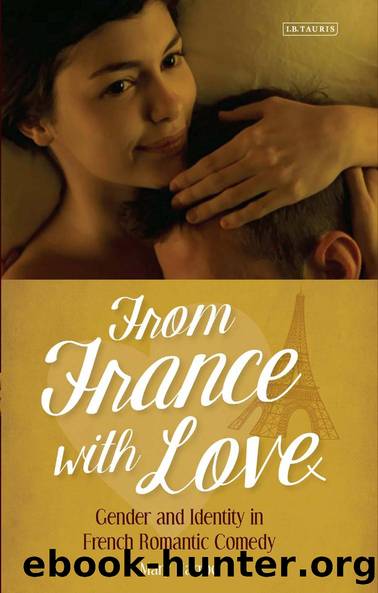From France With Love by Mary Harrod

Author:Mary Harrod [Harrod, Mary]
Language: eng
Format: epub
ISBN: 9781350225145
Barnesnoble:
Publisher: Bloomsbury Academic
Published: 2021-01-28T00:00:00+00:00
Homosexuality and the Family
In her 2002 article on âqueering the familyâ through âfantasy and the performance of sexuality and gay relationsâ in rom-coms Gazon maudit and Pourquoi pas moi? (Stéphane Giusti, 1999), Kate Ince argues that in these texts the paradigm of the bourgeois family shifts to accommodate queer identities. At the end of Gazon, lesbian Marijo has joined married couple Laurent and Loli as the triumvirate sets about raising the baby who is the product of a one-time liaison between Laurent and Marijo. Not only that but âdifference proliferatesâ as there is a hint that staunchly heterosexual Laurent may be starting an affair with another man. In Pourquoi pas moi?, several families come together in a Catalan country house for their children â including, unusually, three lesbians (and one gay man) â to break to them the news that they are homosexual. Thanks to the couple-swapping antics of the older generation, by the end of the film, â[a] wholesale âqueeringâ of the family has occurred, which is reinforced by the new relationships forgedâ (Ince 2002: 95â6). As Ince notes, the role of performance in constructing gender and identity (not to mention the Spanish setting echoing Almodóvarâs work) in the film feeds into its queer aesthetic, as for example when two mothers Diane and Saraâs feelings for each other are reawakened by singing a song together for the group. While these women â and Dianeâs husband Tony â are both singers, Evaâs father is a world-famous torero, played by Johnny Hallyday. Even more excessive is the filmâs finale, which â like visions of the Virgin Mary appearing before Chouchou â uses kitsch to create a âcamp and sentimentalâ decor and atmosphere, as âa spangle-attired cabaret singer atop an illuminated podium draped with semi-naked dancers clad as angels/cherubs performs a love song called âCrazyââ (ibid: 95).
Pédale douce and also Crustacés adhere to Inceâs model. The 1996 film, as already mentioned, is set in the colourfully excessive world of Parisian drag, which â echoing Kath Westonâs (1991) description of the networks formed by some groups of homosexuals in San Francisco â operates in the film as an alternative kinship structure. Brassart rightly attributes Pédale douceâs huge success (3.9 million spectators) to changing attitudes about homosexuality in France. Hence gay Adrienâs assumption of paternity of another manâs child can be presented as positive â although biological father Alexandre does show up at the christening, prompting a âliberatingâ final image of the parental trio and the baby driving around Paris in a car singing the highly camp âSans contrefaçonâ by Mylène Farmer. Interestingly, in contrast to Tarr with Rolletâs (2001: 189) argument that the filmâs âoutrageous drag queens function primarily as an exotic backdrop to the development of a conventional, heterosexual romanceâ, for Brassart the filmâs strength lies in the parallels it draws between gay and straight identities. Thus Adrienâs paternal desire echoes Alexandreâs wifeâs fear of being separated from her husband, both of these being socially constructed â as feminist Elisabeth Badinter has observed in relation to parental care in LâAmour en plus (1980) (Brassart 2007: 234).
Download
This site does not store any files on its server. We only index and link to content provided by other sites. Please contact the content providers to delete copyright contents if any and email us, we'll remove relevant links or contents immediately.
Naked as Nature Intended by Pamela Green(452)
The Filmmaker's Guide to Creatively Embracing Limitations: Not Getting What You Want Leading to Creating What You Need (for True Epub) by Pace William & Stobbe Ingrid(446)
30 Movies to Get You Through the Holidays by Roger Ebert(418)
Bond, James Bond by Brad Gilmore(387)
It's Only a Movie! by Haberski Jr. Raymond J(354)
The Making Of Horror Movies by Jennifer Selway(330)
Chinese films in focus II by Unknown(314)
How To Write A Novel The Easy Way Using The Pulp Fiction Method To Write Better Novels: Writing Skills by Jim Driver(313)
The Fellowship of the Knits: Lord of the Rings: The Unofficial Knitting Book by Tanis Gray(310)
Smartphone Cinema: Making Great Films with Your Mobile Phone by Bart Weiss(310)
Charles McGraw by Alan K. Rode(290)
Film Truth; November, 1920 by Anonymous(288)
Thomas Mann and Friedrich Nietzsche: Eroticism, Death, Music, and Laughter by Caroline Joan Picart(287)
The Greatest Show on Earth by Jerry Pinto(284)
The Romanian Cinema of Nationalism: Historical Films as Propaganda and Spectacle by Onoriu Colăcel(270)
Jurassic Park and Philosophy by Watkins Jessica Michaud Nicolas(264)
The Garden in the Machine by Unknown(262)
Jafar Panahi: Interviews by Unknown(258)
The Reel Truth by Reed Martin(258)
